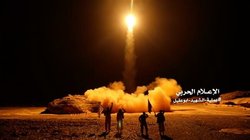 A recent retaliatory missile attack by Yemeni armed forces on a Saudi airport could be a “game changer” in the ongoing Saudi-led war against the impoverished Arab country, says an American analyst.
A recent retaliatory missile attack by Yemeni armed forces on a Saudi airport could be a “game changer” in the ongoing Saudi-led war against the impoverished Arab country, says an American analyst. RNA - “What the missile strike on the airport shows is that Yemen has been able to successfully defend itself against the ongoing attacks that are being waged by the coalition,” Keith Preston, director of Attackthesystem.com, told Press TV.
Despite the fact that Yemen is experiencing one of the world’s “most significant humanitarian crisis”, it has still been able to hold its position in the face of the coalition, he added.
Earlier on Wednesday, a Yemeni military source told al-Masirah TV that Yemeni forces had targeted the Abha airport in the kingdom’s southwestern Asir region with a cruise missile and brought a halt to air traffic in the area.
Later, the Saudi-led coalition waging war on Yemen confirmed the strike on the airport.
The Virginia-based analyst said the attack highlights the coalition’s military weakness against Yemen’s army and also draws attention to the fact that it has been unable to achieve victory after four years.
The United Arab Emirates is Saudi Arabia’s key ally in its war on Yemen.
Preston further said such attacks could upset both Riyadh and Dubai’s trade activities.
“One thing about attacking airports is that Saudi Arabia and the UAE alike are both heavily dependent on international commerce for their economy. The UAE, in particular, is a major international trade center in the region. So making air travel unsafe in the region would have the effect of undermining the economies of Saudi Arabia and the UAE to a significant degree.”
He said the missile strike could also change the game on the ground in favor of Yemeni troops and fighters from the Houthi Ansarullah movement.
“It (the missile strike) can potentially be a game changer in the sense that the attack by Yemen has raised the cost to Saudi Arabia when Saudi Arabia and other members of the coalition are faced with these kinds of internal attacks.”
Commenting on the strike, the spokesman for Yemeni armed forces said the cruise missile had directly hit the Abha airport’s air traffic control tower and left it out of service.
Speaking at a press conference in the capital Sana’a on Wednesday, Brigadier General Yahya Saree said that advanced American systems provided to the Saudi regime had failed to intercept the missile.
The attack was a response to the crimes committed by aggressors and their unjust siege of Yemen, he added.
The Yemeni Army — led by the Houthi Ansarullah movement — regularly targets positions inside Saudi Arabia in retaliation for the Saudi war, which began in March 2015 in an attempt to reinstall the country’s Riyadh-allied former regime.
The missile strike came days after the Houthi movement warned that the airports of the countries involved in the military aggression against Yemen will be targeted as long as the embargo imposed by the Saudi regime and its allies on the Sana’a International Airport remains in place.
847/940